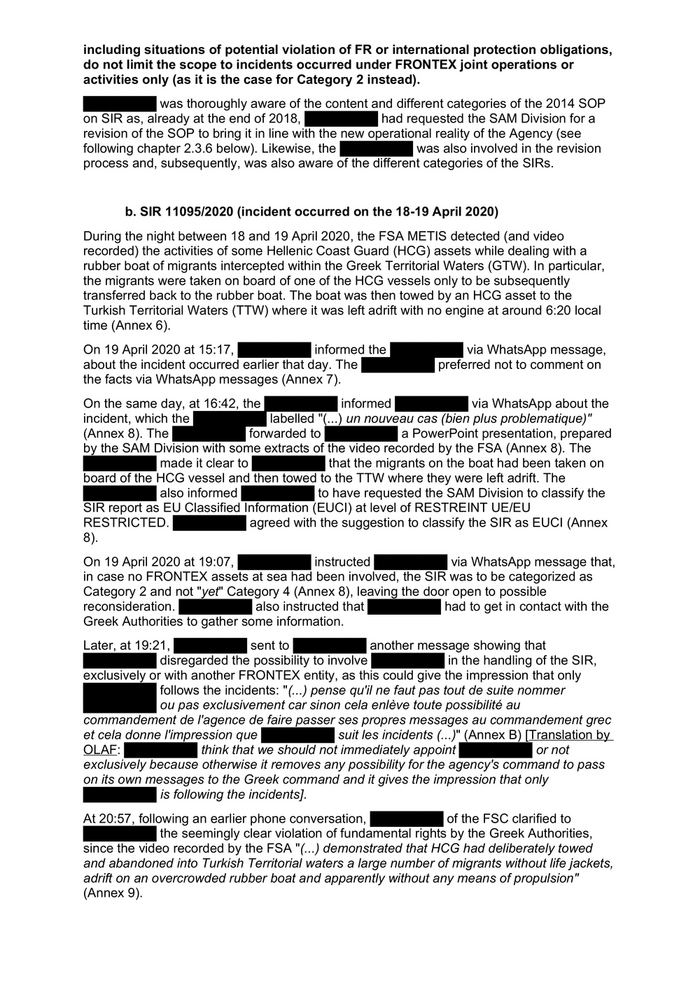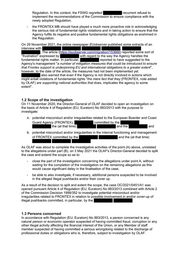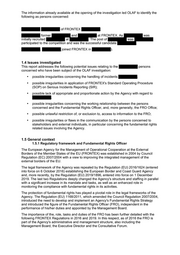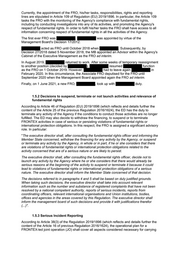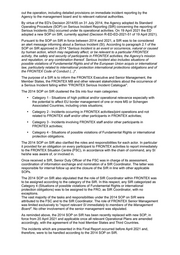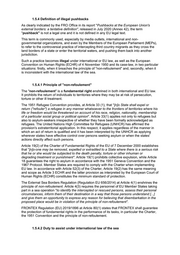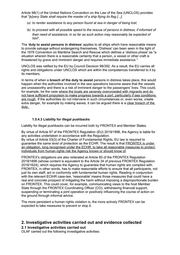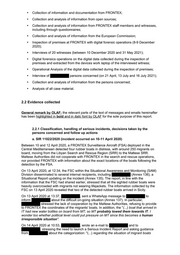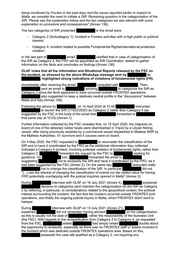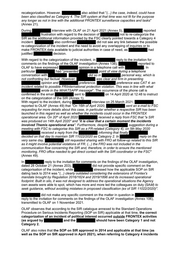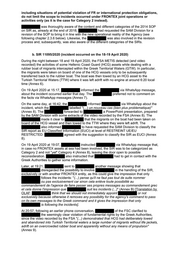OLAF Final Report on Frontex
CASE No OC/2021/0451/A1
Facsimile of original document. Length of redactions may appear different than in the original.
Regulation. In this context, the FSWG regretted ████████ recurrent refusal to implement the recommendations of the Commission to ensure compliance with the newly adopted Regulation; - the FRONTEX MB should have played a much more proactive role in acknowledging the serious risk of fundamental rights violations and in taking action to ensure that the Agency fulfils its negative and positive fundamental rights obligations as enshrined in the Regulation. On 29 November 2021, the online newspaper EUobserver published some extracts of an interview with ████████ ████████ ████████ ████████, ████████ ████████. The article (https://euobserver.com/migration/153666) reported some sort of "frustration" expressed by ████████ with regard to the way the Agency handles the fundamental rights matter. In particular, ████████ reported to have suggested to the Agency's management "a number of mitigation measures that could be introduced to ensure that Frontex support is underpinning EU and international obligations to a greater extent", however, to the date of the article, the measures had not been implemented yet. ████████ also warned that even if the Agency is not directly involved in actions which might entail violations of fundamental rights "the mere fact that they (FRONTEX, note added by OLAF) are supporting national authorities that does, implicates the agency to some extent". 1.2 Scope of the investigation On 11 November 2020, the Director-General of OLAF decided to open an investigation on the basis of Article 4 of Regulation (EU, Euratom) No 883/2013 with the purpose to investigate: A. potential misconduct and/or irregularities related to the European Boarder and Coast Guard Agency (FRONTEX), ████████ committed by the ████████ ████████ the (at that time) ████████ ████████ and the ████████ and B. potential misconduct and/or irregularities in the internal functioning and management of FRONTEX committed by the ████████ ████████ and the (at that time) ████████ ████████ ████████ As OLAF was about to complete the investigative activities of the point (A) above, unrelated to the allegations under part (B), on 3 May 2021 the OLAF's Director-General decided to split the case and extend the scope so as to: - close the part of the investigation concerning the allegations under point A, without waiting for the completion of the investigation on the remaining allegations as this would cause significant delay in the finalisation of the case; - be able to also investigate, if necessary, additional persons suspected to be involved in the alleged illegal pushbacks and/or their cover up. As a result of the decision to split and extent the scope, the case OC/2021/0451/A1 was opened pursuant Article 4 of Regulation (EU, Euratom) No 883/2013 combined with Article 2 of the Commission Decision 1999/352 to investigate potential misconduct and/or irregularities related to FRONTEX in relation to possible involvement in and/or cover-up of illegal pushbacks committed, in particular, by the ████████ ████████ 1.3 Persons concerned In accordance with Regulation (EU, Euratom) No 883/2013, a person concerned is any natural person or economic operator suspected of having committed fraud, corruption or any other illegal activity affecting the financial interest of the Union, or any Member of staff member suspected of having committed a serious wrongdoing related to the discharge of professional duties or obligations who is, therefore, subject to investigation by OLAF.
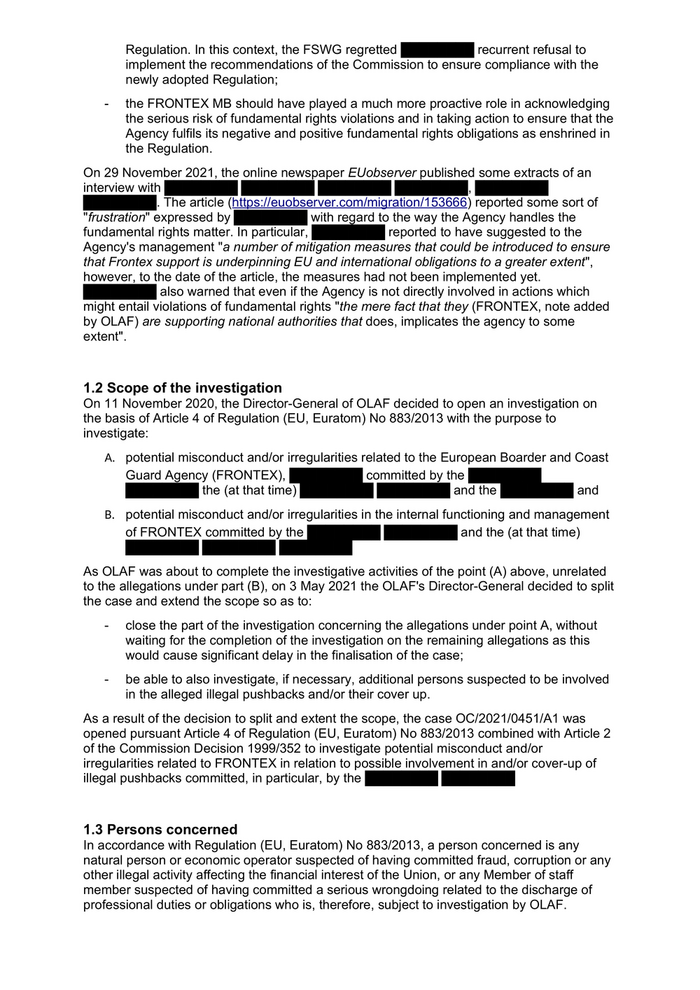
The information already available at the opening of the investigation led OLAF to identify the following as persons concerned: ████████ ████████ of FRONTEX ████████; ████████ former ████████ and ████████ at FRONTEX. As ████████ was initially recruited ████████ at ████████. The post of ████████ was ████████ participated to the competition and was the successful candidate ████████; ████████. ████████ joined FRONTEX in ████████). 1.4 Issues investigated This report addresses the following potential issues relating to the ████████ persons concerned who have been subject of the OLAF investigation: possible irregularities concerning the handling of incidents ████████; possible irregularities in application of FRONTEX's Standard Operating Procedure (SOP) on Serious Incidents Reporting (SIR); possible lack of appropriate and proportionate action by the Agency with regard to ████████; possible irregularities concerning the working relationship between the persons concerned and the Fundamental Rights Officer, and, more generally, the FRO Office; possible unlawful restriction of, or exclusion to, access to information to the FRO; possible irregularities or flaws in the communication by the persons concerned to stakeholders and external individuals, in particular concerning the fundamental rights related issues involving the Agency. 1.5 General context 1.5.1 Regulatory framework and Fundamental Rights Officer The European Agency for the Management of Operational Cooperation at the External Borders of the Member States of the EU (FRONTEX) was established in 2004 by Council Regulation (EC) 2007/2004 with a view to improving the integrated management of the external borders of the EU. The legal framework of the Agency was repealed by the Regulation (EU) 2016/1624 (entered into force on 6 October 2016) establishing the European Border and Coast Guard Agency and, more recently, by the Regulation (EU) 2019/1896, entered into force on 1 December 2019. The last two Regulations deeply changed the Agency's structure and staffing in parallel with a significant increase in its mandate and tasks, as well as an enhanced role in monitoring the compliance with fundamental rights in its activities. The protection of fundamental rights has played a pivotal role in the legal frameworks of the Agency. The Regulation (EU) 1168/2011, which amended the Council Regulation 2007/2004, introduced the need to develop and implement an Agency's Fundamental Rights Strategy and introduced the figure of the Fundamental Rights Officer (FRO), independent in the performance of his/her duties and appointed by the Management Board. The importance of the, role, tasks and duties of the FRO has been further detailed with the following FRONTEX Regulations in 2016 and 2019. In this respect, as of 2016 the FRO is part of the Agency's administrative and management structure, also including the Management Board, the Executive Director and the Consultative Forum.
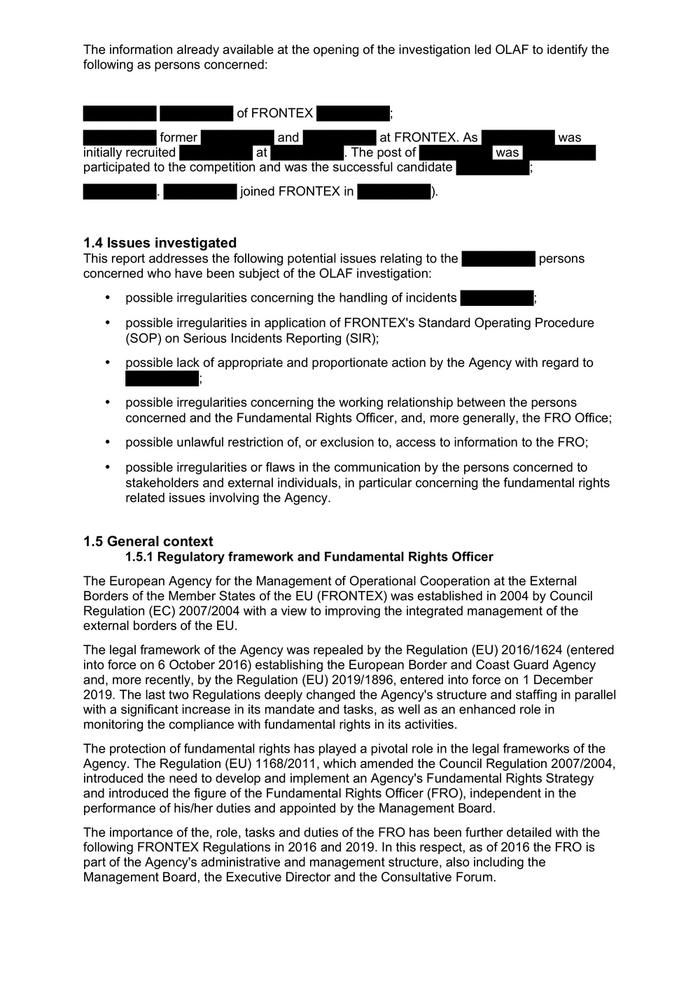
Currently, the appointment of the FRO, his/her tasks, responsibilities, rights and reporting lines are stipulated in Article 109 of Regulation (EU) 2019/1896. In particular, the Article 109 tasks the FRO with the monitoring of the Agency's compliance with fundamental rights, including by conducting investigations into any of its activities, and promoting the Agency's respect of fundamental rights. In order to fulfil his/her tasks the FRO shall have access to all information concerning respect of fundamental rights in all the activities of the Agency. The first ever FRO was ████████. ████████ was appointed by virtue of the Management Board's Decision 17/2012. ████████ acted as FRO until October 2018 when ████████. Subsequently, by Decision 27/2018 dated 5 November 2018, the MB appointed an Advisor within the Agency's Cabinet of the Executive Management as the FRO ad interim. In August 2019, ████████ returned to work. After some weeks of temporary reassignment to another position (decided by ████████), ████████ resumed ████████ function as the FRO on 1 October 2019. However, ████████ had to leave again ████████ in February 2020. In this circumstance, the Associate FRO deputised for the FRO until September 2020 when the Management Board appointed again the FRO ad interim. Finally, on 1 June 2021, a new FRO, ████████, took up with ████████ duty. 1.5.2 Decisions to suspend, terminate or not launch activities and relevance of fundamental rights According to Article 46 of Regulation (EU) 2019/1896 (which reflects and details further the content of the Article 25 of the previous Regulation 2016/1624), the ED has the duty to terminate any activity of the Agency if the conditions to conduct those activities are no longer fulfilled. The ED may also decide to withdraw the financing, to suspend or to terminate FRONTEX activities in case of serious or persisting violations of fundamental rights or international protection obligations. In this respect, the FRO is assigned a significant advisory role. In particular: "The executive director shall, after consulting the fundamental rights officer and informing the Member State concerned, withdraw the financing for any activity by the Agency, or suspend or terminate any activity by the Agency, in whole or in part, if he or she considers that there are violations of fundamental rights or international protection obligations related to the activity concerned that are of a serious nature or are likely to persist. The executive director shall, after consulting the fundamental rights officer, decide not to launch any activity by the Agency where he or she considers that there would already be serious reasons at the beginning of the activity to suspend or terminate it because it could lead to violations of fundamental rights or international protection obligations of a serious nature. The executive director shall inform the Member State concerned of that decision. The decisions referred to in paragraphs 4 and 5 shall be based on duly justified grounds. When taking such decisions, the executive director shall take into account relevant information such as the number and substance of registered complaints that have not been resolved by a national competent authority, reports of serious incidents, reports from coordinating officers, relevant international organisations and Union institutions, bodies, offices and agencies in the areas covered by this Regulation. The executive director shall inform the management board of such decisions and provide it with justifications therefor (...)". 1.5.3 Serious Incident Reporting According to Article 38(3) of the Regulation 2019/1896 (which reflects and details further the content of the Article 16 of previous Regulation 2016/1624), the operational plan for a FRONTEX-led joint operation (JO) shall cover all aspects considered necessary for carrying
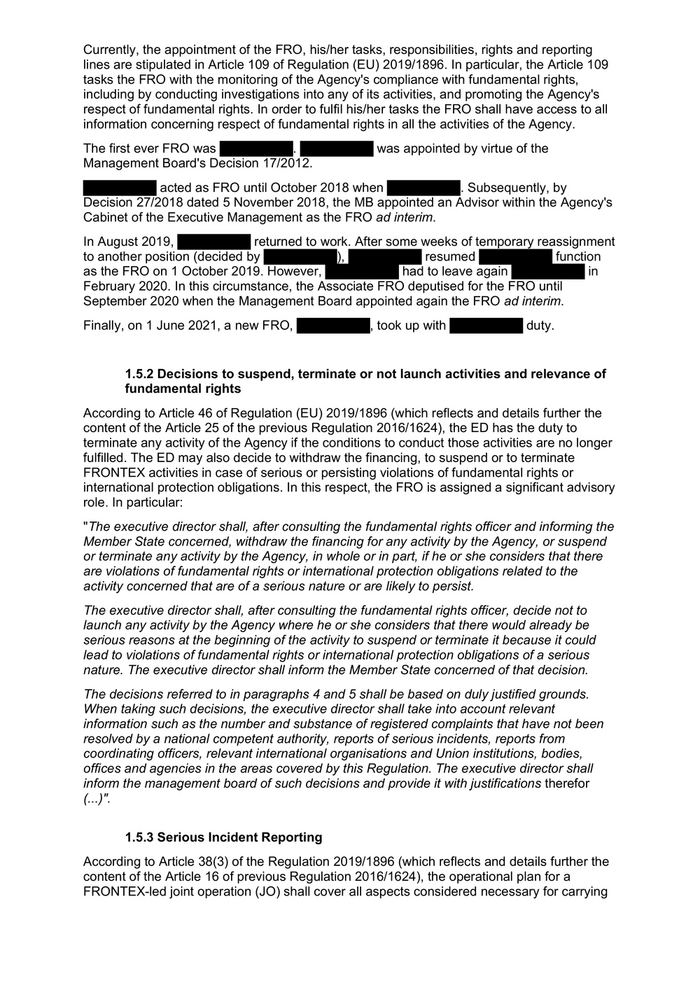
out the operation, including detailed provisions on immediate incident reporting by the Agency to the management board and to relevant national authorities. By virtue of the ED's Decision 2014/55 on 31 July 2014, the Agency adopted its Standard Operating Procedure (SOP) on Serious Incident Reporting (SIR) concerning the reporting of Serious Incidents (SIs) occurred under its operational activities. On 19 April 2021 the ED adopted a new SOP on SIR, currently applied (Decision R-ED-ED-2021-51 of 19 April 2021). Pursuant to the SOP on SIR in force between 2014 and 2021, a SIR was to be considered an alert message informing about a Serious Incident (SI). According to paragraph 2.1 of the SOP on SIR approved in 2014 "Serious Incident is an event or occurrence, natural or caused by human action, which may negatively affect, or be relevant to a particular FRONTEX activity, the safety and security of participants in FRONTEX activities, the Agency's mission and reputation, or any combination thereof. Serious Incident also includes situations of possible violations of Fundamental Rights and of the European Union acquis or international law, particularly related to international protection international protections obligations and of the FRONTEX Code of Conduct (...)". The purpose of a SIR is to inform the FRONTEX Executive and Senior Management, the Member States, the FRONTEX MB and other relevant stakeholders about the occurrence of a Serious Incident falling within "FRONTEX Serious Incident Catalogue". The 2014 SOP on SIR clustered the SIs into four main categories: Category 1 - Situations of high political and/or operational relevance especially with the potential to affect EU border management of one or more MS or Schengen Associated Countries, including crisis situations; Category 2 - Incidents occurring in FRONTEX activities/joint operations and not related to FRONTEX staff and/or other participants in FRONTEX activities; Category 3 - Incidents involving FRONTEX staff and/or other participants in FRONTEX activities; Category 4 - Situations of possible violations of Fundamental Rights or international protection obligations. The 2014 SOP on SIR also clarified the roles and responsibilities for each actor. In particular it provided for an obligation on every participant to FRONTEX activities to report immediately to the FRONTEX Situation Centre (FSC), in accordance with the chain of command, any SI he/she was aware of, or involved in. Once received a SIR, Senior Duty Officer of the FSC was in charge of its assessment, coordination of information exchange and nomination of a SIR Coordinator. The latter was responsible for internal follow up and the closure of the SIR in line with other applicable SOPs. The 2014 SOP on SIR also stipulated that the role of SIR Coordinator within FRONTEX was to be assigned according to the category of the SIR. In this respect, any SIR categorized as Category 4 (Situations of possible violations of Fundamental Rights or international protection obligations) was to be assigned to the FRO, as SIR Coordinator, with no exceptions. The vast majority of the tasks and responsibilities under the 2014 SOP on SIR were attributed to the FSC and to the SIR Coordinator. The role of FRONTEX Senior Management was limited exclusively to "report relevant SI immediately to members of the Management Board". No other involvement of the senior management was stipulated. As reminded above, the 2014 SOP on SIR has been recently replaced with new SOP, in force from 20 April 2021 and applicable once all relevant Operational Plans are amended accordingly, with the agreement of the host Member States and Third Countries. The incidents which are presented in this Final Report occurred before April 2021 and, therefore, were to be handled according to the 2014 SOP on SIR.
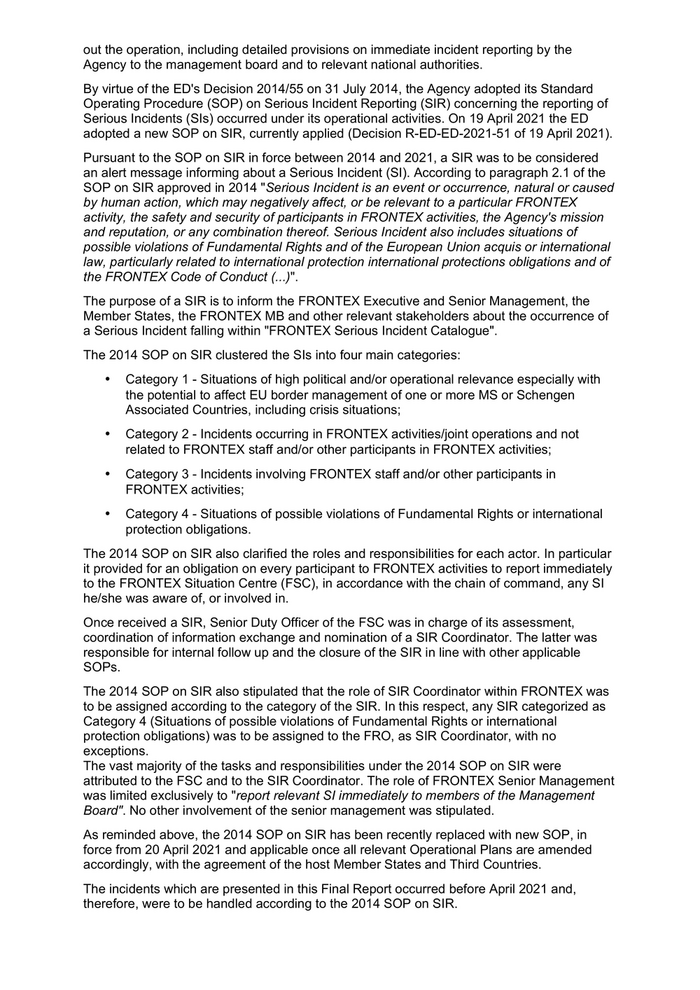
1.5.4 Definition of illegal pushbacks As clearly indicated by the FRO Office in its report "Pushbacks at the European Union's external borders: a tentative definition", released in July 2020 (Annex 42), the term "pushback" is not a legal one and it is not defined in any EU legal text. This term is commonly used, especially by media outlets, international and non- governmental organizations, and even by the Members of the European Parliament (MEPs), to refer to the controversial practice of intercepting third country migrants as they cross the land borders of a state or enter the territorial waters, and pushing them back into another jurisdiction. Such a practice becomes illegal under international or EU law, as well as the European Convention on Human Rights (ECHR) of 4 November 1950 and its case-law, in two particular situations: firstly, when it breaches the principle of "non-refoulement" and, secondly, when it is inconsistent with the international law of the sea. 1.5.4.1 Principle of "non-refoulement" The "non-refoulement" is a fundamental right enshrined in both international and EU law. It prohibits the return of individuals to territories where they may be at risk of persecution, torture or other ill treatment. The 1951 Refugee Convention provides, at Article 33 (1), that "[n]o State shall expel or return ("refouler") a refugee in any manner whatsoever to the frontiers of territories where his life or freedom would be threatened on account of his race, religion, nationality, membership of a particular social group or political opinion". Article 33(1) applies not only to refugees but also to asylum-seekers irrespective of whether they have been formally acknowledged as refugees. The United Nations High Committee for Refugees (UNHCR) has affirmed the provision's extraterritorial application. In this respect, it applies regardless of the manner in which an act of return is qualified and it has been interpreted by the UNHCR as applying wherever states have effective control over persons seeking asylum or when the states' actions directly affect such persons. Article 19(2) of the Charter of Fundamental Rights of the EU of 7 December 2000 establishes that "[n]o-one may be removed, expelled or extradited to a State where there is a serious risk that he or she would be subjected to the death penalty, torture or other inhuman or degrading treatment or punishment". Article 19(1) prohibits collective expulsion, while Article 18 guarantees the right to asylum in accordance with the 1951 Geneva Convention and the 1967 Protocol. Member States are required to comply with the Charter when implementing EU law. In accordance with Article 52(3) of the Charter, Article 19(2) has the same meaning and scope as Article 3 ECHR and the latter provision as interpreted by the European Court of Human Rights (ECHR) constitutes the minimum standard of protection. The External Sea Borders Regulation (Regulation EU 656/2014) at Article 4(1) enshrines the principle of non-refoulement. Article 4(3) requires the personnel of EU Member States taking part in a sea operation "to identify the intercepted or rescued persons, assess their personal circumstances, inform them of their destination in a way that those persons understand [...] and give them an opportunity to express any reason for believing that disembarkation in the proposed place would be in violation of the principle of non-refoulement". FRONTEX Regulation (EU) 2019/1896 at Article 80(1) states that FRONTEX shall guarantee the protection of fundamental rights in the performance of its tasks, in particular the Charter, the 1951 Convention and the principle of non-refoulement. 1.5.4.2 Duty to assist under international law of the sea
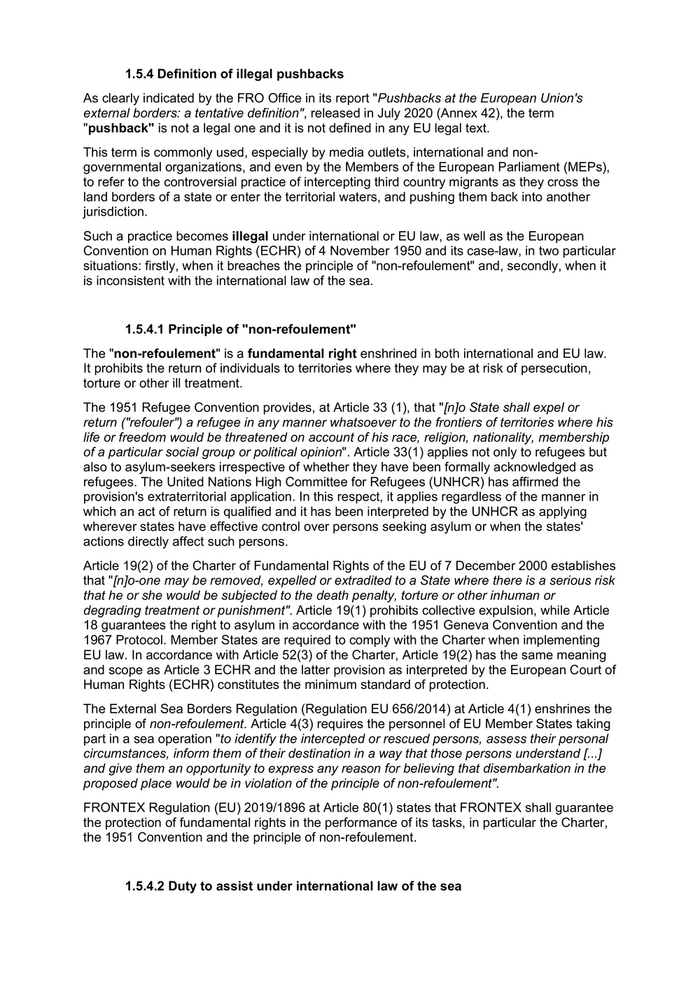
Article 98(1) of the United Nations Convention on the Law of the Sea (UNCLOS) provides that "[e]very State shall require the master of a ship flying its flag [...]: (a) to render assistance to any person found at sea in danger of being lost; (b) to proceed with all possible speed to the rescue of persons in distress, if informed of their need of assistance, in so far as such action may reasonably be expected of him". The 'duty to assist persons in distress' applies to all ships which have reasonable means to provide salvage without endangering themselves. 'Distress' can been seen in the light of the 1979 Convention on Maritime Search and Rescue which defines a 'distress phase' as "a situation wherein there is a reasonable certainty that a person, a vessel or other craft is threatened by grave and imminent danger and requires immediate assistance." UNCLOS was ratified by the EU by Council Decision 98/392. As a result, the EU carries all rights and obligations under UNCLOS which are within the competences transferred to it by its members. In terms of when a breach of the duty to assist persons in distress takes place, this would happen when the authorities involved in the sea operations become aware that the vessels are unseaworthy and there is a risk of imminent danger to the passengers' lives. This could, for example, be the case where the boats are severely overcrowded with migrants and do not have sufficient propulsion to make progress towards a port, particularly if sea conditions are rough. If the authorities do not intervene in such circumstances or, even worse, create extra danger, for example by making waves, it can be argued there is a clear breach of the duty. 1.5.4.3 Liability for illegal pushbacks Liability for illegal pushbacks can be incurred both by FRONTEX and Member States. By virtue of Article 97 of the FRONTEX Regulation (EU) 2019/1896, the Agency is liable for any activities undertaken in accordance with the Regulation. By virtue of Article 53(3) of the Charter of Fundamental Rights, EU law is required to guarantee the same level of protection as the ECHR. The result is that FRONTEX is under an obligation, long recognised under the ECHR, to take all reasonable measures to protect individuals from human rights risk the Agency knows or should know of. FRONTEX's obligations are also reiterated at Article 80 of the FRONTEX Regulation 2019/1896 (whose content is equivalent to the Article 34 of previous FRONTEX Regulation 2016/1624), which requires the Agency to guarantee that human rights are complied with. FRONTEX, in other words, has to make reasonable efforts to ensure that all participants, not just its own staff, act in conformity with fundamental human rights. Reading in conjunction with the relevant ECtHR case-law, 'reasonable' means those measures that could have a real and concrete prospect of mitigating the harm without imposing a disproportionate burden on FRONTEX. This could cover, for example, communicating views to the host Member State through the FRONTEX Coordinating Officer (CO), withdrawing financial support, suspending or terminating a joint operation or positively influencing the course of action on the ground through informal advice. The more persistent a human rights violation is, the more actively FRONTEX can be expected to take measures to prevent or stop it. 2. Investigative activities carried out and evidence collected 2.1 Investigative activities carried out OLAF carried out the following investigative activities:
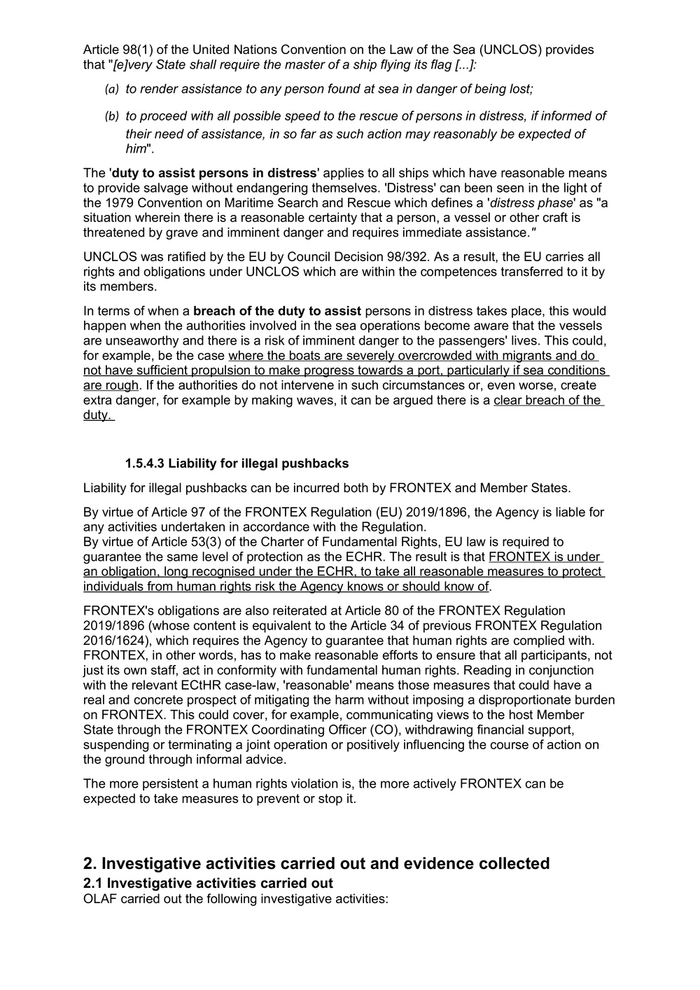
Collection of information and documentation from FRONTEX; Collection and analysis of information from open sources; Collection and analysis of information from FRONTEX staff members and witnesses, including through questionnaires; Collection and analysis of information from the European Commission; Inspection of premises at FRONTEX with digital forensic operations (8-9 December 2020); Interviews of 20 witnesses (between 10 December 2020 and 31 May 2021); Digital forensics operations on the digital data collected during the inspection of premises and extracted from the devices work laptop of the interviewed witness; Operational Analysis of the digital data collected during the inspection of premises; Interview of ████████ persons concerned (on 21 April, 13 July and 16 July 2021); Collection and analysis of information from the persons concerned; Analysis of all case material. 2.2 Evidence collected General remark by OLAF: the relevant parts of the text of messages and emails hereinafter has been highlighted in bold and in italic font by OLAF for the sole purpose of this report. 2.2.1 Classification, handling of serious incidents, decisions taken by the persons concerned and follow up actions a. SIR 11022/2020 (incident occurred on 10-11 April 2020) Between 10 and 12 April 2020, a FRONTEX Surveillance Aircraft (FSA) deployed in the Central Mediterranean detected four rubber boats in distress, with around 250 migrants on board, moving from the Libyan Search and Rescue Region (SRR) to the Maltese SRR. Maltese Authorities did not cooperate with FRONTEX in the search and rescue operations, nor provided FRONTEX with information about the exact locations of the boats following the detection by the FSA. On 13 April 2020, at 12:34, the FSC within the Situational Awareness and Monitoring (SAM) Division disseminated to several internal recipients, including ████████ (Annex 136), a Situational Report updating on the incident (Annex 135). The report, in line with the information that the FSC had shared earlier, stressed that all the sighted rubber boats were heavily overcrowded with migrants not wearing lifejackets. The information collected by the FSC on 13 April 2020 revealed that two of the detected rubber boats arrived in Sicily. On 13 April 2020 at 13:37, ████████, sent a WhatsApp message to ████████ to inform ████████ about the difficult on-going situation (Annex 137). In particular, ████████ stressed the lack of cooperation by the Maltese Authorities, refusing to provide to FRONTEX the coordinates of the migrants' boats. In addition, the "(...) boat that arrived in IT had new water bottles on board from MT; so MT probably towed them towards IT. I wonder too whether political level could put pressure on MT since this becomes a human irresponsible situation". On 14 April 2020 at 10:53, ████████, wrote an e-mail to ████████ and to ████████, stressing the need to launch a Serious Incident Report and asking guidance from ████████ about the categorization: "(...) regarding the situation of migrant boats
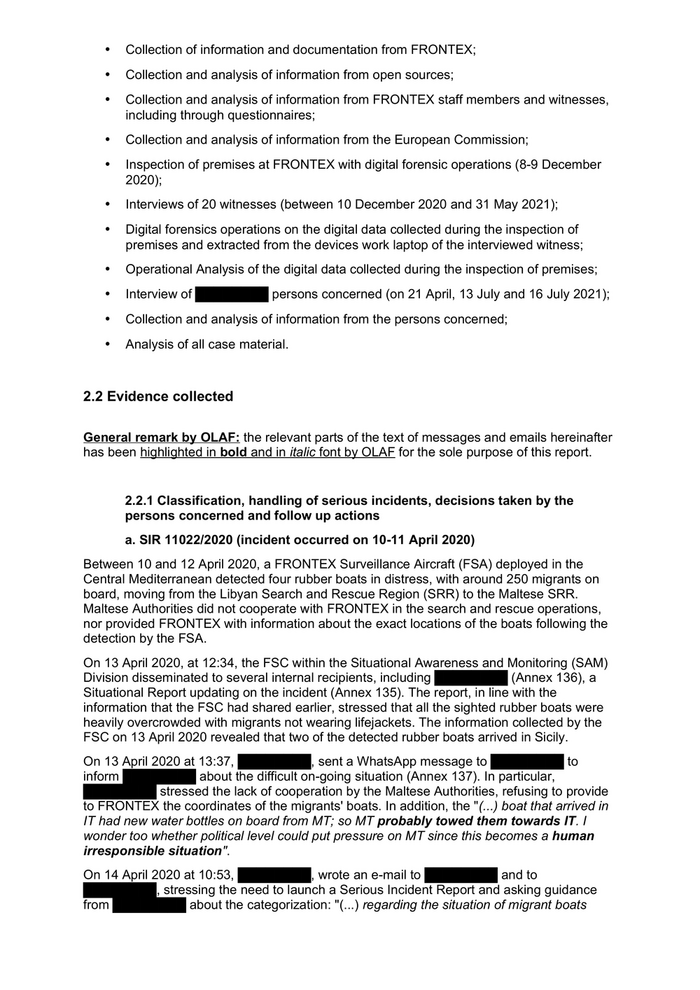
being monitored by Frontex in the past days and the issues reported earlier in respect to Malta, we consider the need to initiate a SIR. Remaining question is the categorisation of the SIR. Please see the explanation below and the two categories we see relevant with some explanation on procedure and consequences" (Annex 136). The two categories of SIR presented ████████ in the email were: - Category 2 (Subcategory 1): Incident in Frontex activities with a high public or political interest; - Category 4: Incident related to possible Fundamental Rights/international protection violation. In the last part of ████████ email, ████████ clarified that in case of categorization of the SIR as Category 4, the FRO will be appointed as SIR Coordinator, tasked to gather information on the facts and concludes on findings (Annex 136). OLAF notes that all the information and Situational Reports released by the FSC on the incident, as stressed by the above WhatsApp message sent by ████████ to ████████, highlighted strong indications of violations of fundamental rights (FR). Immediately after receiving the email, ████████ consulted with ████████. Then, ████████ sent an email to ████████ advising ████████ to categorize the SIR as Category 2 since the facts appeared to have occurred outside FRONTEX operations. ████████ also suggested to keep a relatively neutral profile in the "discussions" between Malta and Italy (Annex 136). Following the advice by ████████, on 14 April 2020 at 12:48 ████████ instructed ████████ to launch the SIR (11022/2020) as Category 2 rather than Category 4 (as suggested by the FSC in the body of the email that ████████ forwarded to ████████ that same day at 10:53) (Annex 1). Further information collected by the FSC revealed that, on 15 April 2020, the migrants on board of one of the detected rubber boats were disembarked in Tripoli by a Libyan fishing vessel, after being previously assisted by a commercial vessel dispatched in Maltese SRR by the Maltese Authorities. 51 survivors and 5 corpses were on board. On 4 May 2020, the FSC requested to ████████ to reconsider the classification of the SIR and to have it coordinated by the FRO as the additional information they collected indicated a Category 4 incident, involving potential violation of fundamental rights, rather than Category 2. ████████ forwarded the request by the FSC to ████████ seeking for guidance. On ████████ turn, ████████ forwarded the email to ████████ suggesting ████████ not to reclassify the SIR and have it coordinated by the FRO, as it had been suggested by the FSC (Annex 2). On the same day ████████ instructed orally ████████ not to change the classification of the SIR. In particular ████████ did not "(...) see the interest of changing the classification of events nor the added value for having FRO potentially overlapping with the judicial inquiries opened in Malta" (Annex 3). During ████████ interview with OLAF on 16 July 2021 (Annex 4), ████████ explained ████████ decision to categorize (and maintain the categorization of) the SIR as Category 2 by referring, in particular, to considerations related to the geopolitical context, the political interest surrounding the incident, the fact that the incident occurred outside FRONTEX joint operations, and finally the ongoing judicial inquiry in Malta, which FRONTEX didn't want to hamper. During ████████ interview with OLAF on 13 July 2021 (Annex 21), ████████ explained ████████ did not remember having advised ████████ on the categorisation, as this is usually not the task of ████████, rather the responsibility of the business Unit (the FSC). With regards to the reclassification from Category 2 to Category 4, as requested from the FSC, ████████ stated ████████ had simply raised ████████ doubts about the opportunity to reclassify, especially as there was no FRONTEX staff or assets involved in the incident which was detected outside FRONTEX operations area. Based on this, ████████ assessed the case still qualified as a Category 2, not requiring any
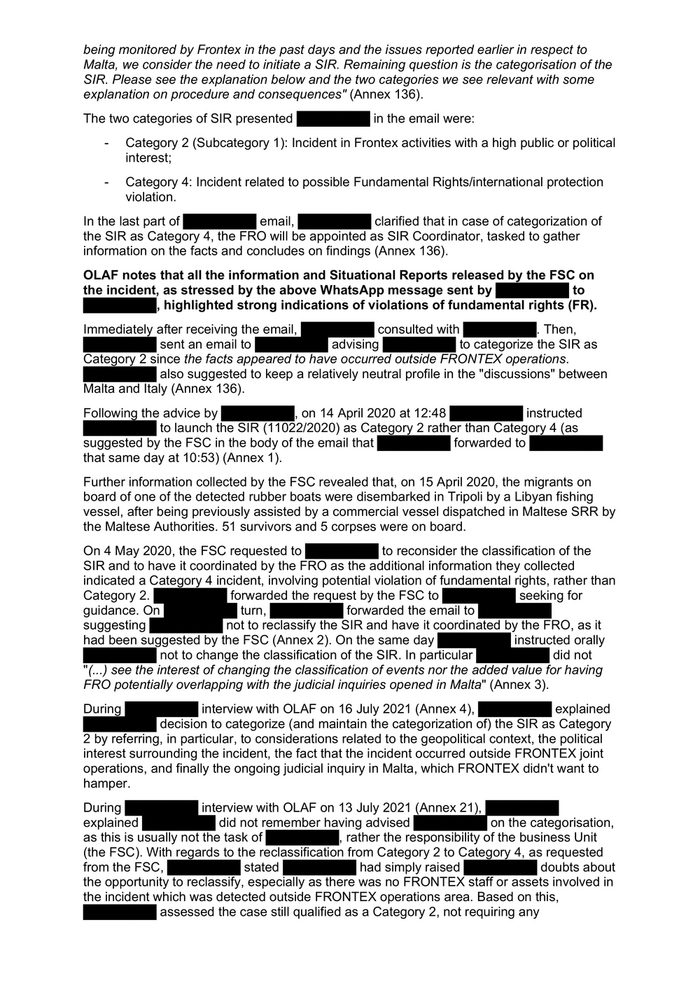
recategorization. However, ████████ also added that "(...) the case, indeed, could have been also classified as Category 4. The SIR system at that time was not fit for the purpose any longer as not in line with the additional FRONTEX surveillance capacities and tasks" (Annex 21). During ████████ interview with OLAF on 21 April 2021 (Annex 5), ████████ reported ████████ frustration with regard to the decision of ████████ not to re-categorize the SIR as the additional information provided by the FSC clearly pointed towards a Category 4 incident. ████████ also confirmed ████████ did not see any link between the possible re-categorization of the incident and the need to avoid any overlapping of inquiries or to make FRONTEX data available to judicial authorities in case of need, as ████████ had justified ████████ decision. With regard to the categorization of the incident, in ████████ reply to the invitation for comments on the findings of the OLAF investigation (Annex 138), ████████ reported to OLAF to have expressed ████████ opinion in a telephone call with ████████. In particular ████████ had "presented ████████ point of view during a telephone conversation with ████████. ████████ did so in ████████ personal way, which is not confronting but factual. However, ████████ was clear and firm in presenting ████████ opinion and ████████ preference. ████████ preference was CAT 4: an incident related to possible FR/international protection violation. This was in line with what ████████ wrote in the WHATSAPP message". The occurrence of the phone call is confirmed in the email ████████ sent to ████████ on 14 April 2020 at 12:48 to instruct on the categorization of the SIR (Annex 1). With regard to the incident, during ████████ interview on 25 March 2021, ████████ reported to OLAF (Annex 49) that "On 16th of April 2020, ████████ sent an e-mail to FSC requesting for more details about this case, in particular whether a respective SIR has been launched in this regard as well as whether the incidents could occur in the FRONTEX th operational area. On 20 of April 2020 ████████ received a reply from FSC that "a SIR was produced on 14th April 2020" and "it is clear that a certain moment the incidents involved Themis operational area". Furthermore, despite ████████ suggestion during a meeting with FSC to categorise this SIR as a FR-related (Category 4), on 5th May 2020 ████████ received a reply from the ████████ informing that finally ████████ decided on that day to maintain SIR 11022/2020 as Category 2. In ████████ reply on the very same day, ████████ still requested sharing with FRO all follow-up related to this SIR as it might involve potential violations of FR. (...) the FRO was not included in the communication flow concerning the SIR and, therefore, in order to ensure the mentioned monitoring, FRO office needed to get direct contact with the SIR coordinator or the FSC" (Annex 49). In ████████ reply to the invitation for comments on the findings of the OLAF investigation, dated 28 October 21 (Annex 203), ████████ did not provide specific comment on the categorisation of the incident, while ████████ stressed how the applicable SOP on SIR dating back to 2014 was "(...) clearly outdated considering the extensions of Frontex's mandate brought by Regulation 2016/1624 and 2019/1896 and its increased operational footprint. Built in silo, it was not designed to address the operational situations the Agency own assets were able to spot, which has more and more led the colleagues on duty (SAM) to seek guidance, without avoiding mistakes in proposed classification (ex of SIR 11022/2020)". ████████ did not make any specific comment on the matter in question in ████████ reply to the invitation for comments on the findings of the OLAF investigation (Annex 106), transmitted to OLAF on 1 November 2021. OLAF observes that according to the SIR catalogue annexed to the Standard Operations Procedure on Serious Incidents Reporting (SOP on SIR) applicable at that time, the correct categorization of an incident of political interest occurred outside FRONTEX activities (as argued by ████████ and the ████████ should have been Category 1 and not Category 2. OLAF also notes that the SOP on SIR approved in 2014 and applicable at that time (as well as the SOP on SIR approved in April 2021), when referring to Category 4 incidents
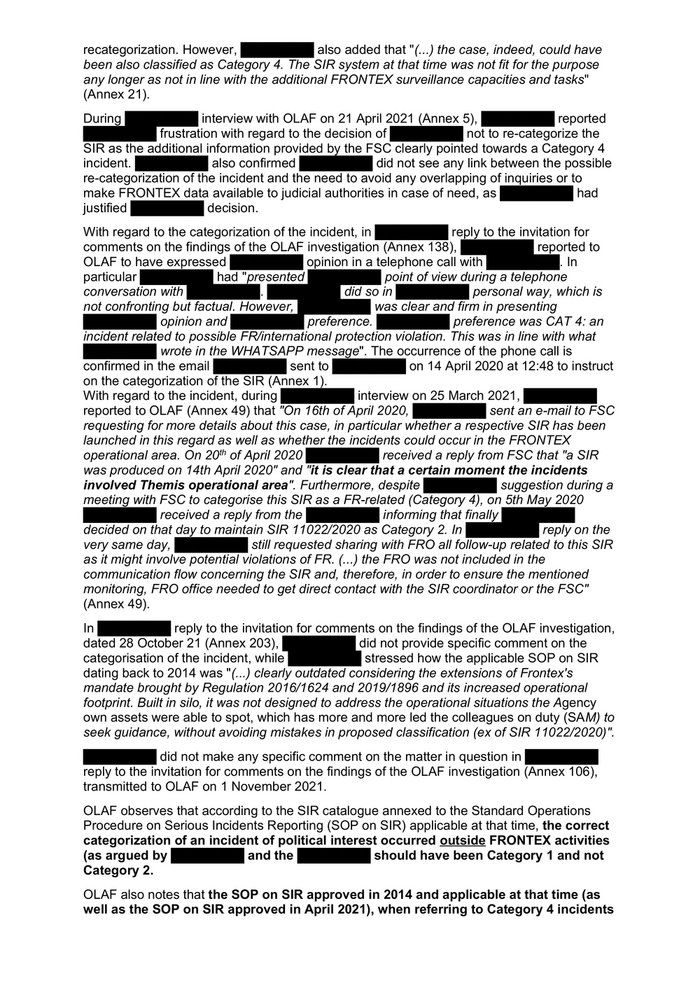
including situations of potential violation of FR or international protection obligations, do not limit the scope to incidents occurred under FRONTEX joint operations or activities only (as it is the case for Category 2 instead). ████████ was thoroughly aware of the content and different categories of the 2014 SOP on SIR as, already at the end of 2018, ████████ had requested the SAM Division for a revision of the SOP to bring it in line with the new operational reality of the Agency (see following chapter 2.3.6 below). Likewise, the ████████ was also involved in the revision process and, subsequently, was also aware of the different categories of the SIRs. b. SIR 11095/2020 (incident occurred on the 18-19 April 2020) During the night between 18 and 19 April 2020, the FSA METIS detected (and video recorded) the activities of some Hellenic Coast Guard (HCG) assets while dealing with a rubber boat of migrants intercepted within the Greek Territorial Waters (GTW). In particular, the migrants were taken on board of one of the HCG vessels only to be subsequently transferred back to the rubber boat. The boat was then towed by an HCG asset to the Turkish Territorial Waters (TTW) where it was left adrift with no engine at around 6:20 local time (Annex 6). On 19 April 2020 at 15:17, ████████ informed the ████████ via WhatsApp message, about the incident occurred earlier that day. The ████████ preferred not to comment on the facts via WhatsApp messages (Annex 7). On the same day, at 16:42, the ████████ informed ████████ via WhatsApp about the incident, which the ████████ labelled "(...) un nouveau cas (bien plus problematique)" (Annex 8). The ████████ forwarded to ████████ a PowerPoint presentation, prepared by the SAM Division with some extracts of the video recorded by the FSA (Annex 8). The ████████ made it clear to ████████ that the migrants on the boat had been taken on board of the HCG vessel and then towed to the TTW where they were left adrift. The ████████ also informed ████████ to have requested the SAM Division to classify the SIR report as EU Classified Information (EUCI) at level of RESTREINT UE/EU RESTRICTED. ████████ agreed with the suggestion to classify the SIR as EUCI (Annex 8). On 19 April 2020 at 19:07, ████████ instructed ████████ via WhatsApp message that, in case no FRONTEX assets at sea had been involved, the SIR was to be categorized as Category 2 and not "yet" Category 4 (Annex 8), leaving the door open to possible reconsideration. ████████ also instructed that ████████ had to get in contact with the Greek Authorities to gather some information. Later, at 19:21, ████████ sent to ████████ another message showing that ████████ disregarded the possibility to involve ████████ in the handling of the SIR, exclusively or with another FRONTEX entity, as this could give the impression that only ████████ follows the incidents: "(...) pense qu'il ne faut pas tout de suite nommer ████████ ou pas exclusivement car sinon cela enlève toute possibilité au commandement de l'agence de faire passer ses propres messages au commandement grec et cela donne l'impression que ████████ suit les incidents (...)" (Annex B) [Translation by OLAF: ████████ think that we should not immediately appoint ████████ or not exclusively because otherwise it removes any possibility for the agency's command to pass on its own messages to the Greek command and it gives the impression that only ████████ is following the incidents]. At 20:57, following an earlier phone conversation, ████████ of the FSC clarified to ████████ the seemingly clear violation of fundamental rights by the Greek Authorities, since the video recorded by the FSA "(...) demonstrated that HCG had deliberately towed and abandoned into Turkish Territorial waters a large number of migrants without life jackets, adrift on an overcrowded rubber boat and apparently without any means of propulsion" (Annex 9).
